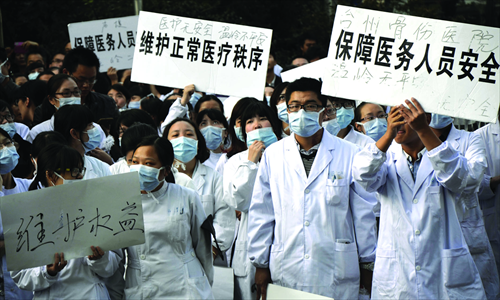Medical exodus

A doctor sets out for a house call in Anyang, Henan Province, October 18. Photo: CFP
After a successful career as a doctor in China's public hospital system for 20 years, 47-year-old Zhang Qiang made a bold decision to quit his job and go private. Almost one year on, he said he has never felt so close to his original dream.
Ten months ago, Zhang announced his high-profile resignation on his personal Sina Weibo, drawing thousands of reposts and comments online and widespread attention among his colleagues and patients. For Zhang, the decision not only meant giving up a 400,000-yuan-a-year job ($65,560) at a top hospital in Shanghai, but also meeting the very practical challenge of survival.
Today, Zhang works under contract for two major private hospitals in Beijing and Shanghai. He said his goal is to build China's top vascular surgery brand within five years.
Zhang is not the only doctor to take the plunge. A number of young doctors like Zhang have made, or are considering making, the decision to leave public hospitals to pursue new possibilities. They might not be the most experienced or famous doctors, but they are all distinguished in their field and have a new understanding of how to practice medicine today.
These doctors chose to rid themselves of the system's constraints because they long for a brighter career, a more relaxed working environment, more income earned through legitimate work, and most of all, to better serve patients and earn the respect that comes with being a doctor, which is why they initially chose to take up this profession.
"In spite of all the difficulties I have experienced so far, I think it was worth it. It is not only a journey of realizing my own dream, but more importantly, it would be an exploration for all doctors in China to seek a new career path in the near future," Zhang told the Global Times.
Reasons for leaving
After graduating from a top medical school in Zhejiang Province in 1992, Zhang worked in three different hospitals and founded two vascular surgery departments at two hospitals before leaving Shanghai East Hospital in 2012.
After years working inside China's public medical system, Zhang describes himself as someone with vested interests in it. Many people didn't understand why he chose to give up everything so many others dream of having.
Zhang had his reasons. After years of struggling inside the system, he said he had clearly understood all of its problems, which he increasingly disliked but was unable to change.
"All I want to do is to be a pure and dignified doctor, but it is impossible to realize that in Chinese public hospitals," Zhang said.
In Zhang's mind, the dignity of a doctor means making a legitimate living through his professional skills without cheating patients with unnecessary examinations and prescriptions to meet the hospital's need for profit.
"But in public hospitals today, it is almost impossible because of its wrong orientation toward profit and problematic management. On the one hand, public hospitals have to take on the huge responsibility of public health, while the government's input is far from enough to support its functions. As a result, hospitals have to ask doctors to 'earn money' through excessive medical treatment, and even receive kickbacks, which goes against a doctor's conscience," Zhang said.
Against such a dysfunctional background, Zhang said it is no surprise that the number of violent incidents between doctors and patients is on the rise across the country. The latest, which occurred in Wenling, Zhejiang Province last Friday, shocked the nation after a patient stabbed one doctor to death and seriously injured two others.
What led Zhang to make his final decision was the birth of his second son. Last year, when Zhang's wife was pregnant, all the doctors from public hospitals told him the baby had to be delivered surgically, since his wife was 40 years old. Zhang then contacted a doctor from a private hospital.
"The doctor did a comprehensive examination and felt my wife was able to have a normal delivery, even though the cost of a surgical delivery is twice that of a natural one. My wife eventually gave birth successfully," Zhang said.
What that doctor said left a deep impression on Zhang. "She told me the most important thing for her is a patient's evaluation, which I totally agree with. If you really gained patients' trust and respect, they will come to you wherever you work," Zhang said.
Several months later, Zhang became this doctor's colleague and started his new career as a "free doctor."

Medical workers holding up placards gather to protest violence against hospital staff at the No.1 People's Hospital in Wenling, Zhejiang Province, Monday. Photo: IC
Going it alone
Zhu Yan, a 33-year-old doctor from Peking Union Medical College Hospital chose a slightly different path. Early last year, he said on his personal Weibo that he decided to leave the public hospital system in order to provide better medical services for patients.
Zhu said he didn't leave the top public hospital in order to get a better income. "I believe most medical students who spent years of hard study and practice have the same dream of becoming a good doctor one day. But in reality, it is common to see doctors spending too much energy on other things, like scientific research and administrative affairs. I don't want to live like that anymore."
Zhu went to Shenzhen in 2012, and after a year of preparation, opened a chain of four clinics at high-end office buildings last December with his two partners.
After several months of pilot operations, the clinics now receive about a dozen patients each day, which is above Zhu's initial estimates.
Zhu and his partners want to learn from the Hong Kong private clinic model and focus on family health care services for high-end clients. All diagnoses and treatments come at a unified package price of 380 yuan. The doctors' salaries are not connected to prescriptions and examinations but to their workload, quality of service and patient feedback.
Multi-site licenses
After 10 months of pilot work, Zhang Qiang has made it, even taking on several paid members for his team.
Nearly a quarter of Zhang's old patients in public hospitals followed him through Weibo to his new hospital. Although the outpatient fee now is 500 yuan, compared to the previous amount of 300 yuan, Zhang is now able to talk to each patient for at least 20 minutes, and patients so far seem fully satisfied.
Unlike the public hospital, where Zhang received a salary and benefits, the relationship with his current hospital is simply a contractual one. The hospital provides doctors a platform and equipment, and the rest is up to the doctors, while the profits are shared as stipulated in the contract.
Now, Zhang can decide his own outpatient service times and how many patients he accepts. He performs no more than six surgeries each week and limits the number of patients to ensure quality of service.
Early this month, Zhang signed another contract with a Beijing-based private hospital as his second multi-site license location for practicing medicine.
In fact, multi-site licenses were introduced by Chinese health authorities into public hospitals as early as in 2009, which allowed doctors to practice in more than one medical institution. The aim of this move was to ensure good quality medical resources, raise doctors' incomes and also to help private hospitals to grow.
However, the policy barely achieved its original purpose, as most big public hospitals were unwilling to let their doctors practice in other hospitals.
"No public hospital was willing to let doctors go, since they had trained and paid them. It is a problem that cannot be solved within the current system," Zhang said.
In July, Beijing-based Caixin.com reported that Shenzhen health authorities were supposed to announce the nation's first program to allow qualified doctors to practice medicine at an unlimited number of locations without permission from their original working unit.
However, the pilot program was withdrawn at the last minute due to pressure from the central government, which was concerned that Shenzhen's reform would be too radical and hurt certain parties' interests.
Questions from peers
But not all doctors agree with Zhang and Zhu. Gu Jinwen, director of Huashan Worldwide Medical Center at Huashan Hospital believes that although these career moves are positive for doctors in China in the long term, they might not be suitable for everyone.
"Private hospitals in China can't compete with public hospitals. They can't provide a big platform for doctors to develop their careers or skills," Gu said.
In Gu's opinion, China's public hospitals have strong academic backgrounds and government support, which ensure good resources, including professional teams, comprehensive and advanced equipment and a large number of patients which can form a database for research, which is still critical for doctors who want to develop their careers.
Chen Nan, director of kidney medicine at Shanghai Ruijing Hospital, agreed with Gu. She told the Global Times that it is very difficult for private medical institutions to become major players in China, as public hospitals tend to monopolize medical resources.
"It is normal to see some doctors go for private hospitals, and I don't think the media should read too much into this," Chen said.
Future prospects
Despite all the questions and challenges, Zhang Qiang believes that realizing a competitive, free-flowing and professional market for practicing medicine is a key premise for future medical reforms.
Zhang said doctors in 90 percent of countries around the world use this kind of system, including contract-based institutions like the one where he works now, and partnership-based clinics such as Zhu's in Shenzhen.
"If free practicing could be realized in China, which means all benefits and risks would fall on the doctors themselves, then they would pay more attention to their personal reputations and professional skills as well as respecting patients' feelings," Zhang said.
Although Zhang and Zhu are still in the minority of Chinese doctors, they are optimistic about the future. "Many of my former colleagues consulted me privately because they all see the big market and opening trend for the medical services industry. There are many more distinguished doctors in China's public hospitals and they are just one step away from being free, Zhang said. "I would like to explore a new path for them."